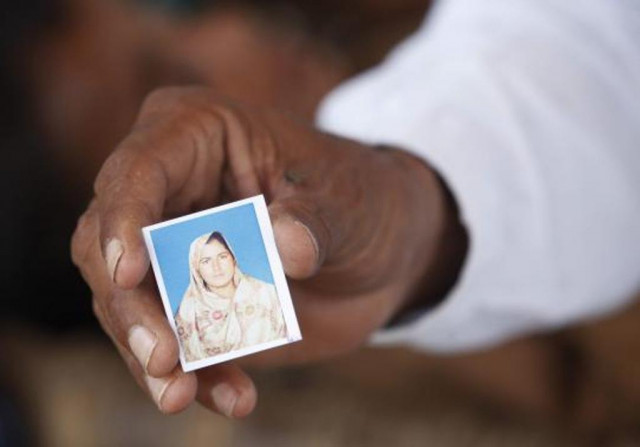Comment: Farzana case - let no more stones be cast
The fact that she and her unborn child were killed in the presence of police and bystander is nauseating and depraved.

A picture of the victim Farzana Iqbal. PHOTO: REUTERS
The gruesome and horrifying murder of Farzana Parveen Iqbal, who was three months pregnant, on May 27 has once again shocked the entire country, as well as the international community.
Parveen was attacked outside the premises of the Lahore High Court with batons and bricks allegedly by 15-20 members of her family, because she dared to exercise her constitutional and religious right to marry the man of her choice. The fact that she and her unborn child were killed in the presence of police and bystanders, who did not intervene to save them, is nauseating and depraved. The incident raises serious questions about the nature of our state and society.
Such an instance, however, should lead to further scrutiny of our sensibilities as they are outraged only when violence inflicted on women is public and breaks the façade of humanity. The everyday violence, abuse, battery and humiliation that every third woman in Pakistan suffers within the four walls of her home doesn’t bother us, though it should. Out of sight, out of mind. Women are beaten up, abused, exchanged, married off in childhood, raped, harassed and denied education and healthcare. Women being killed in the name of ‘honour’ on a daily basis is so naturalised in our collective consciousness that we do not see it as violence anymore.
It must be understood that violence is a continuum. The prevalence and acceptance of ‘milder’ forms of violence ultimately leads to more extreme forms that eventually outrages the public. If we wish to eliminate inhuman forms of violence against women, then we must develop zero tolerance for all forms of such acts.
Parveen’s killing should not be seen as an isolated act or aberration. It took place within the larger socio-cultural, economic and legal context. In patriarchies, men consider women their private property and a vessel of honour. Whenever women try to assert themselves as an independent entity by making their own choices, they are silenced or killed like Parveen.
To bring change in patriarchal thinking we need to remove the material bases of patriarchy that have roots in certain feudal, tribal and capitalist setups.
This is a structural issue that begs a structural solution. If we are serious about eliminating gender-based violence in society, we have to come up with short, mid and long-term measures. These must ensure that mindsets are altered and are sensitised to women as entities with autonomy and identity.
Long-term measures include dismantling tribal, feudal and capitalist economic structures that enable economic exploitation and oppression of women. Change in thinking can only be made possible and sustainable through education and mass awareness campaigns. Women need to be empowered through acquiring education, skill and economic independence in order to be able to protect themselves.
Medium term measures include removal of discriminatory laws which make honour killing a compoundable offence and people are allowed to get out with court settlements. We need to amend these laws and make honour killing a crime against the state. The male-dominated criminal justice system that has hardly made any convictions in the cases of violence against women must be held accountable.
In the short term, incidents of violence against women must be treated a top priority in the justice system. The culprits should be awarded severest punishment in the shortest possible time. Speedy justice in cases of violence against women will serve as a deterrent. The short term measures are perhaps the most important because they can lead to transformative solutions, so that more women don’t suffer a plight like Farzana Parveen’s.
Published in The Express Tribune, June 1st, 2014.



















COMMENTS
Comments are moderated and generally will be posted if they are on-topic and not abusive.
For more information, please see our Comments FAQ